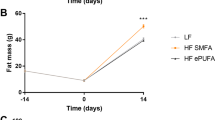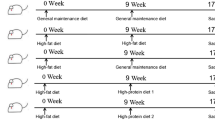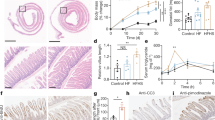Abstract
INCORPORATION of a small amount of lactose in the diet of young albino rats increases their food intake and they grow better than the control rats fed on sucrose. This increased food intake leads to greater weight and increased fat content of their liver and kidney1. If the food intake of lactose-fed rats is equalized to that of the sucrose-fed rats by the paired-feeding technique, the liver and kidney fat content decreases in the lactose-fed rats.
This is a preview of subscription content, access via your institution
Access options
Subscribe to this journal
Receive 51 print issues and online access
$199.00 per year
only $3.90 per issue
Buy this article
- Purchase on Springer Link
- Instant access to full article PDF
Prices may be subject to local taxes which are calculated during checkout
Similar content being viewed by others
References
Sadhu, D. P., Ind. J. Physiol. and Allied Sci., 9, 156 (1955).
Sadhu, D. P., Amer. J. Physiol., 174, 238; 175, 283 (1953).
Author information
Authors and Affiliations
Rights and permissions
About this article
Cite this article
SADHU, D. Lactose as a Lipotropic Agent. Nature 177, 1236–1237 (1956). https://doi.org/10.1038/1771236a0
Issue Date:
DOI: https://doi.org/10.1038/1771236a0
This article is cited by
-
Zur Wirkung von Lactose in der Nahrung auf das Wachstum und die Gehirnentwicklungspotenz bei Ratten
Zeitschrift für Ernährungswissenschaft (1974)
-
Carbohydrate Metabolism in Hypervitaminosis A.
Nature (1959)
Comments
By submitting a comment you agree to abide by our Terms and Community Guidelines. If you find something abusive or that does not comply with our terms or guidelines please flag it as inappropriate.



